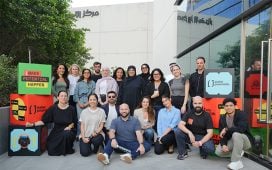Using social media to create a revolution only leads to chaos and disruption, argues Ghanem Nuseibeh
“Don Quixote in his imaginary adventure encounters a group of merchants, and cries out: “Let the whole world stand, if the whole world does not confess that there is not, in the whole world, a damsel more beautiful than the Empress of Mancha”. The Arab Uprising has shaken the way we understand politics, communications and public diplomacy. Social media may have played a role in the unrest, but pretending that the uprising is a social media revolution is as imaginary as the existence of the Empress of Mancha.
On the political front, what social media has contributed to is to push furth










Nuseibeh always makes interesting and thought-provoking points. I’m not sure i completely agree on this one except to say that i agree its too early to decide.
There might also be a tipping point for social media too.
Once considered a secretive pre-occupation bordering on cultism, now just about everyone is connected in some way, to social media.
So with that connection is the inherent dilution of opinion that comes from a million people being told the same thing, then setting about to set their own place in the scheme, thus firming their stake in the revolution.
I agree that social networking played a part, but for all of the calls to arms it might have borne, it still takes people to be brave enough to march with their bodies and fists rather than their BlackPhones and Thumbs.
“Evidence so far suggests that countries with higher internet penetration were not subject to the unrest seen by those with lower accessibility.” im not sure that is the case but it may be true. would be interesting to see if there are any studies done on that point.
Nuseibeh might have mentioned that the Lucien Hudson he quotes so warmly in his article was the Managing Director of the company he himself works for, from 2009 until a couple of weeks ago. A little bit less than fully transparent there, Ghanem?
And Campaign ME’s readers will be thrilled to know that his Comment piece has been picked up ON HIS OWN COMPANY’S NEWS STRAND! Wow, that’s amazing: he writes a comment, then writes a comment about it. This is so laughably self-important and such a clear demonstration of the fatuous solipsism of almost all blogging. In 99.9% of cases, it’s only the writer and his mum that reads it – if she isn’t too busy.
However, ignoring, for the moment, the enormously pretentious tone of his confused, self-serving piece, let’s take a couple of parts of Nuseibeh’s forthright-yet-cautious argument (in so far as one can be discerned):
He says: “So … in the Arab Uprising, social media has been…putting power in the hands of even fewer than those who held it in the past. As a result, social media is highly manipulable and more subject to elite control than people seem to realise…..
…..Some Arab bloggers, like the widely followed Sultan Al Qassemi or Mishaal Al Gergawi…. have enriched our understanding and have become indispensable sources of opinion.”
Do I detect a slight contradiction here? Let me get this right: it’s really bad to allow social media power to fall into the hands of an elite, and yet it’s really good that the sanctioned bloggings that are so enlightening are from the very, very wealthy sons of very, very wealthy fathers, with their massive implied investment in the status quo?
Readers with strong stomachs might like to visit Nuseibeh’s company website to see the web of comforting waffle, designed to elicit handsome fees from global bureaucrats, that he is so proud of. Useful information there includes a reference to Claridges being the closest hotel to their Mayfair office in London. Not many of the demonstrators in the Arab Uprising will ever be staying there, I suspect.
Dear Sceptic Isle,
Thank you very much for the constructive criticisms. I believe in the value of dialogue more than in talking at people, or in a vacuum. Please allow me to respond.
I see nothing odd about citing one of my former colleagues, whose work I obviously know. I hope you didn’t find it difficult to penetrate the intransparency that we were colleagues. While I disagree in your characterisation of this as non-transparent, I applaud your readiness to check all connections. This critical perspective is crucial in keeping everyone honest, engaged, and constructive.
Unfortunately I found your characterisation of my argument less helpful. It is, I’m sure you know, easy to use terms as pretentious, confused, self-serving, and so on. I could easily reply in kind. It is more difficult to actually show why an adjective is justified. Instead of a more titillating but less useful mudfight, please allow me to pay you the courtesy of concentrating on the one adjective you try to support, “confused.”
You make a good point about the prima facie contradiction. The two well-known bloggers I mention have at least tens of thousands of followers and they, for observers and analysts alike, make sober comments about current affairs. I do not see the relevance that they come from well-heeled backgrounds, or that our offices are in Mayfair! The point that I was trying to make was that the social media tools are controlled by a small handful of people who can quite easily afford to buy Claridges, let alone have an office near it! And so what if in some countries people are content with the status quo? I think this is testimony to the good governance of that particular country that people do not find the need to go into the streets and demonstrate, even though social media and internet penetration is widespread. The Arab Spring is not about rich vs poor, but about bad governance in some countries that led to the anarchy that we see. It is not because some Twitter user decided to start a revolution in 140 characters! If they did – whether they’re rich or poor, then that is called anarchy!
Please feel free to contact me directly if you wish to discuss further.
Very best,
Ghanem